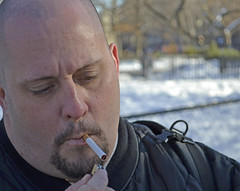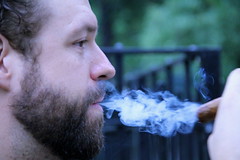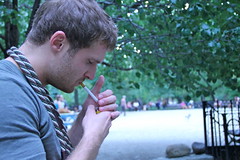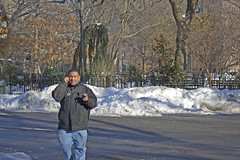 Mark Riffee The city’s expanded smoking ban applies to city parks, including Tompkins Square Park where these smokers were lighting up.
Mark Riffee The city’s expanded smoking ban applies to city parks, including Tompkins Square Park where these smokers were lighting up.When City Council members voted the other day for Mayor Michael Bloomberg’s latest anti-smoking bill there was urgent debate for and against the legislation, which bans cigarette smoking in all New York City parks, certain public “plazas” (Times Square, for instance), and on all of its public beaches. Some Councilmen considered the bill to be a vital public health measure. Others, like Manhattan’s Robert Jackson, warned that such laws move us toward “a totalitarian society.”
But no worries. If Mr. Bloomberg signs the bill as expected, East Villagers will be able to enjoy the sanctuary of Tompkins Square Park this summer – safe in the knowledge that they can sit on a bench and talk for hours on cell phones, bang on bongos until sundown, or practice their scales on a tuneless guitar while others are trying to read – without even a wisp of silent smoke to poison their cacophonous idylls.
And if smokers do wish to smoke, they may leave the park, as if it were an unusually large restaurant, and indulge themselves on the periphery. In time, the subsequent clotting and befouling of the sidewalks around the park might understandably irritate pedestrians, thus leading to a new ban. Eventually, smokers may be forced to take their chances and light up in the middle of the road.
It is undeniable that smoking is harmful to one’s health and there is ample evidence that smokers can indeed quit. Well, at least some of them can. Perhaps even most. But certainly not all. Certain stubborn souls just can’t, or won’t, shake the habit. Then there are schizophrenics, the bipolar types, the deeply depressed, and others to whom cigarettes are a crucial crutch.
But it is possible that even people in those types of extremis may be limited in their ability to smoke in the privacy of their own homes. That already is the case in some “green” condos.
For with each new bit of legislation limiting the ability to inhale the non-smoker becomes increasingly emboldened against the smoker, and feels ever more free to complain. In some cases, the very being of a person puffing away peacefully becomes an affront, and arguments about the perils of second-hand smoke and the sensitivity of asthmatic children can be seen as transparent straw man for pure antipathy. Bigotry and bullying are eternal; outlaw them in one area of life, and they reappear in another. And what of the once pitied homeless, many of whom may consider a cigarette to be a treasured treat in a luckless life? The official response would seem to be, “Too bad, buddy. Why don’t you go jogging, instead?”
So what response is there to the anti-smoking movement? Effectively, smokers have been shamed into passivity, and chances are minimal that tens of thousands will descend upon Central Park and stage a giant smoke-in, of the sort once organized by marijuana proponents. Having been made to feel unclean, tobacco smokers have no wish to exhibit themselves en masse in public.
The anti-smoking lobby is full of dubious self-righteousness and wobbly statistics. But its zealous preoccupation with the health of others is odd. Once, excessive smoking would have appeared as a sickness of the soul made manifest – like alcoholism or drug addiction – and might even have been blamed on an evil spirit. Today’s health-morality activists blame nothing on evil spirits. They blame it on you, and the most extreme forgive neither the sin nor the sinner. Do they honestly think someone lighting a cigarette in Times Square is going to give them cancer? And if it’s other people’s health they’re so concerned about, why are they so concerned? Isn’t being a busy-body symptomatic of deep unhappiness?
Eventually, short of putting smokers in jail (where smoking was banned not long ago) Mayor Bloomberg and his successors will surely have to ban the sale and consumption of cigarettes and tobacco products altogether if they are serious about stopping their consumption. Then, perhaps, officials could require addicts to display nicotine patches on their foreheads when in public.
In the meantime, those who wish to enjoy an elegiac smoke in Tompkins Square, perhaps privately saluting the shades of such legendary East Village smokers as Charlie Parker and W.H. Auden, should scrape the ice off a park bench, lay down a couple of newspapers (which may soon be gone as well) on which to sit, and then enjoy the warming fumes of their chosen poison while they still can. Soon, maybe, everyone will be “healthy,” if not entirely happy.
Join the conversation: Share your thoughts about the expanded smoking ban.






